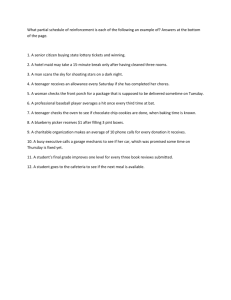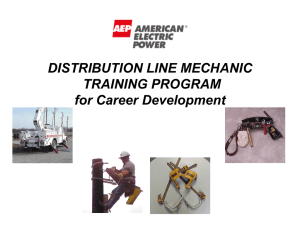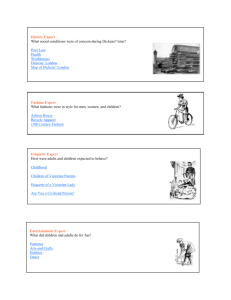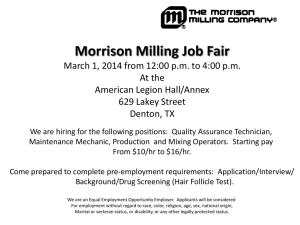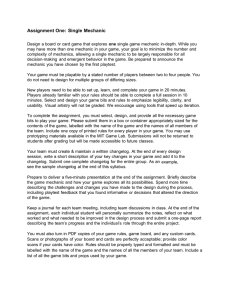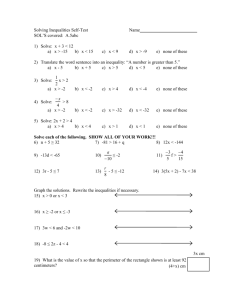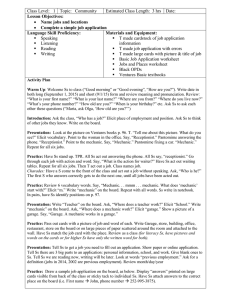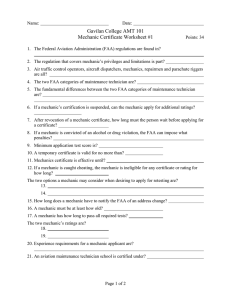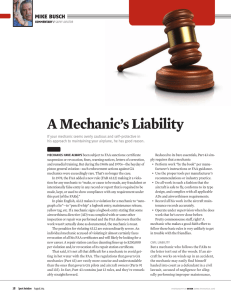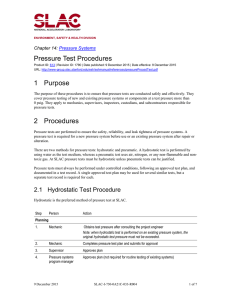STS.464 :: The Intellectual History ...
advertisement
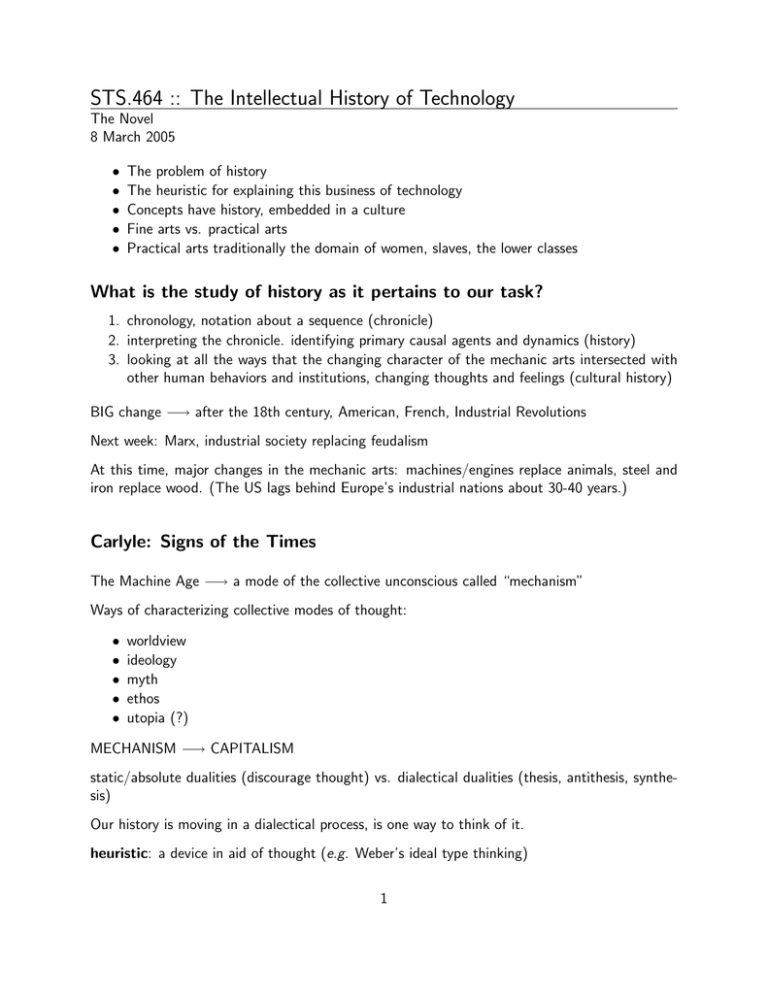
STS.464 :: The Intellectual History of Technology The Novel 8 March 2005 • The problem of history • The heuristic for explaining this business of technology • Concepts have history, embedded in a culture • Fine arts vs. practical arts • Practical arts traditionally the domain of women, slaves, the lower classes What is the study of history as it pertains to our task? 1. chronology, notation about a sequence (chronicle) 2. interpreting the chronicle. identifying primary causal agents and dynamics (history) 3. looking at all the ways that the changing character of the mechanic arts intersected with other human behaviors and institutions, changing thoughts and feelings (cultural history) BIG change −→ after the 18th century, American, French, Industrial Revolutions Next week: Marx, industrial society replacing feudalism At this time, major changes in the mechanic arts: machines/engines replace animals, steel and iron replace wood. (The US lags behind Europe’s industrial nations about 30­40 years.) Carlyle: Signs of the Times The Machine Age −→ a mode of the collective unconscious called “mechanism” Ways of characterizing collective modes of thought: • worldview • ideology • myth • ethos • utopia (?) MECHANISM −→ CAPITALISM static/absolute dualities (discourage thought) vs. dialectical dualities (thesis, antithesis, synthe­ sis) Our history is moving in a dialectical process, is one way to think of it. heuristic: a device in aid of thought (e.g. Weber’s ideal type thinking) 1 Exploring the question of the class At some point, all the earlier concepts of the mechanic arts seemed inadequate, noncommunicative −→ “technology” emerges, becomes a key word, changing character/modes of thinking involving this concept. What were the circumstances surrounding this transition? This class is a collective inquiry into this question. • Need to consider what “technology” does not convey as well as what it does. • The term “technology” is less specific, more all­encompassing and fuzzy, than “mechanic arts.” • A necessary but not sufficient cause for the shift is a change in the character of ma­ chines/tools. • Be hyperconscious to anachronism: Why do we feel compelled to use “technology” applied to Dickens and Carlyle when they didn’t use it themselves? What is going on that cries out for it? (Hard Times is bursting with technology, but the word ain’t there!) • Be your own pollster: when other people use the term, ask them what exactly they mean by it. • The form of the answer is historical: we are assuming the history of the mechanic arts holds the answer. Try and do this in nonspecialized disciplinary vocabulary — avoid jargon! Make your writing accessible to a lay audience. What about the anachronism of the term “science” (e.g. “ancient science,” “medieval science”)? • Tolerance for older language that may seem inadequate to our contemporary minds? • Perhaps “science” isn’t as easy to confuse. The boundaries of “technology” are much less clear. • The term “scientist” comes into common use around the same time as “technology,” circa the 1830s. Dickens: Hard Times One proposal: Dickens didn’t use the word “technology” because he didn’t need it: he was more interested in these “national prosperity figures.” The Industrial Revolution was imperialist from the start, always global. −→ reform vs. revolution Technology: educating the public, inculcating them, strong educational program (e.g. the factory and the school in Hard Times). mercantile capitalism −→ industrial capitalism mechanicanistic philosophy −→ capitalist industry control, exploitation 2 Problematic social/economic/political situation, no resolution... Dickens’s instinctive sentiments were with the workers, but he couldn’t stomach the political implications. In his day, there was more feeling that the class clash could be resolved than there is today, but Dickens, despite his sympathies, didn’t back it. Louisa: model of how to go. Standard American pop culture solution to political/social problems −→ individual conversion. utilitarianism: greatest happiness of the greatest number Whitehead: You need philosophy to give science a goal, to stretch what you know. Machines, nature, and language • Steam engines described as elephants in a state of “melancholy madness” • Elephant in captivity; zoos, gardens • Powerful animal for work • Work out of control, sad −→ What’s the inherent logic of this in this book? • Rational machines compared to an elephant • enraging, furious −→ What’s happening to nature? • Exotic creature harnessed, imported • Poisoning the natural world • Natural world inscribed with mechanism • Image of nature harnessed irrationally, the animal world being put to work • Outrage focused on machines, not people • Other animals: the circus The Circus: portrayed as an oasis in industrial society where men live in harmony with nature and animals, a model for natural redemption. Hard Times as a women’s novel: women’s relationships with men, with each other. Think of the role of the novel in introducing people to parts of society with which they are unfamiliar, to which they do not have access. Bringing this to bear on the question of the class... Hypothesis: If we take these descriptions of Coketown as emblematic of the mechanic arts at the time — today what comes to mind is the Internet — doesn’t this suggest why “mechanic arts” 3 needed a replacement? “Technology,” a word unfettered by dirt, poison, and smoke, cleaning up the act of “mechanism?” A greater abstraction, perhaps leading to an erroneous/skewed view of what “technology” actually entails? From smokestacks to clean lab benches, a fellow seated at a computer terminal... Postindustrialism −→ Daniel Bell, “postindustrial society” −→ increased abstraction from the grittiness of work Place −→ is technology grounded in place, landscape? We are increasingly abstracted from literal places. space of place vs. space of flows −→ does this decontenxtualize? If it’s not situated in the larger landscape, is it less accountable, so to speak? NO PLACE AT ALL! −→ Space loses identity: you think of things, not places (e.g. email itself becomes emblematic of the work to be done). The decline of the countryside as a site of working and living, the rise of the city. Lewis Mumford’s film The City eotechnic/paleotechnic/neotechnic Coketown: roiling, motion −→ ever increasing stillness in “technology” (e.g. travel, digital electronics) E. M. Forster’s The Machine Stops (1909) In Hard Times, all the characters seem profoundly lonely, have little physical interaction with one another. 4
